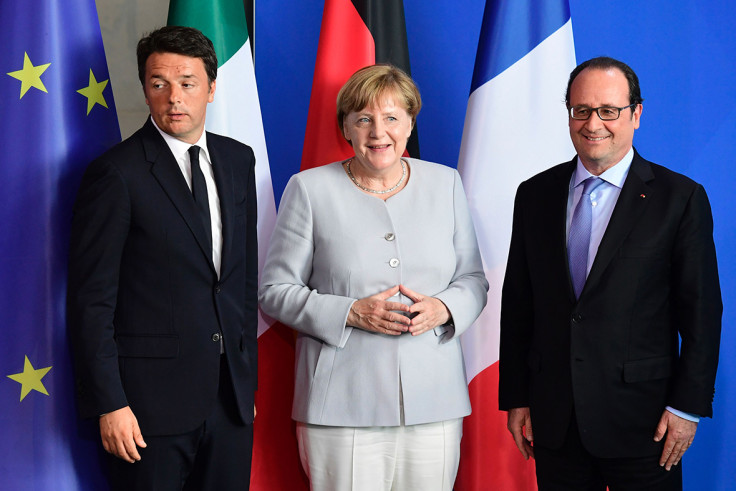Bright side to Brexit: UK's ecommerce platform potential can easily surpass that of Europe
EU lacks significant digital platform strategy – so the UK, with its large ecommerce market, could capitalise.

No doubt many of us did not want it to happen, but now the vote is for leaving the EU, there are some mature voices telling us to live with the consequences. Part of the new accommodation relies on figuring out where the UK economy can play to its strengths.
Britain is no longer a manufacturing hub and, very likely, its financial services sector will shrink. It is already happening anyway. For example, state-owned RBS has been quietly pulling out of transaction banking and handing its customers over to willing recipients in Paris and Frankfurt.
This is a terrible example for the Government to set and, in my view, already sets the precedent for London's decline. But what has gone un-commented on so far is the structural weakness of the EU economy and how the UK can position itself anew.
Despite being the biggest consumer market in the world, the EU has no major ecommerce platform: China has Alibaba, the US has Amazon, Japan has Rakuten – and all are in expansion mode. As we move increasingly towards digital, this lack of a major European benchmark player in this field is a critical weakness.
Ecommerce is where the future of trade will play out. Conventional trade and trade routes are in decline.
Decline is visible in the recent performance of the global shipping company Maersk, or AP Moller-Maersk, based in Denmark. Maersk is the world's largest shipping company, but it just fired its CEO because of continuing poor performance.
Superficially, Maersk faces the problem of slowing global trade. But there are two other factors at work. The first is rising competition from China in container shipping services.
According to Reuters: "Former state-controlled rivals COSCO and China Shipping Group have merged to create China COSCO Shipping Corporation. Separately, China Merchants Group is buying logistics group Sinotrans & CSC Holdings Co."
And therein lies the second clue. While trade, as measured by shipping is static, trade measured by logistics is growing quickly. The reason for that takes us back to the ecommerce platform issue.
China cross-border ecommerce will grow to $1trn (£751.5bn, €903.9bn) this year and to nearly $3trn by 2020. Global cross-border ecommerce will easily exceed 25% of today's global import in goods values by 2020.
In other words more of the world's trade is going through platforms and logistics rather than through merchants and ships. This represents a huge structural economic shift. It means that different players benefit and it means much of the trade does not appear in official statistics. Most politicians are missing this.
Here are three things happening now below the radar:
- Logistics companies are looking at how to become ecommerce platforms
- Shipping companies are looking at how they can become logistics companies
- Any company worth its executive salaries is looking at how it can become a platform
In short, the world economy is changing. It is probably growing, but the growth is happening in digital channels.
The EU economy has failed to adapt to digital. It needs to adapt away from hardware dependence (cars, consumer electronics, pharmaceuticals) towards software and service platforms.
Yet Europe lost its hold in mobile operating systems in 2011, having led the world through Nokia; it has one of the more interesting browsers in Opera, but has never got it out of a niche; and there is no EU-based equivalent of Airbnb, Uber or Lyft. Though the UK had a Dropbox equivalent in Huddle, the company is effectively headquartered in San Francisco.
The EU has no indigenous search engine, despite having spawned Alltheweb at the same time as Page and Brin founded Google. There is no equivalent of Facebook, despite early successes such as Friends Reunited; there is a LinkedIn-type platform, but you may never have heard of Xing; nor is there a messenger service the size of WeChat – although Telegram has scaled its origins and its base is not fully transparent, according to Wikipedia.
The platform with the strongest claim on dominance is Spotify – and music is a global language.
The absence of any response to the growing dominance of digital, indeed any capacity to respond, is the EU's primary economic problem.
Why it doesn't have a major ecommerce platform is because of tax competition: Luxembourg politicians, for example, gave Amazon unspecified tax perks to settle its European operations in the country. Nascent European platforms had to fight a competitor that paid next to no tax. Uber enjoys an analogous position in The Netherlands.
The silver lining in all this is that the UK is Europe's leading ecommerce market. In 2016 retail, UK consumers are expected to spend £174bn (€209.3bn) online. In contrast Germany's ecommerce sales total around €50bn (£41.6bn). The critical factor is how this translates into import and export figures. Here too, Germany lags behind the UK. The UK is the European benchmark.
What all of this means is that the UK is in a prime position to take the lead in cross-border ecommerce, supported by logistics and advanced payment systems, as the digital channel becomes more significant.
Cross-border ecommerce is also primed to be a tariff free form of trade as China gradually imposes its desire to capitalise on its own distinct advantages in this area of business.
There will be increasing pressure to operate outside of existing multilateral trade agreements because China is not involved in many of them. The opportunity is there for the UK to take, but to do so it needs to stimulate the growth of platforms.
Haydn Shaughnessy is a principal of the Disruption House, based in London, and author of Platform, Disruption, Wave.
© Copyright IBTimes 2025. All rights reserved.






















